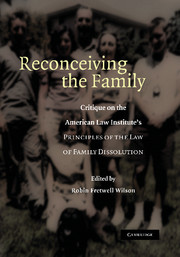 Reconceiving the Family
Reconceiving the Family Book contents
- Frontmatter
- Contents
- Acknowledgments
- Foreword, by Mary Ann Glendon
- List of Contributors
- Introduction
- PART ONE FAULT
- PART TWO CUSTODY
- 3 Partners, Care givers, and the Constitutional Substance of Parenthood
- 4 Custody Law and the ALI's PRINCIPLES: A Little History, a Little Policy, and Some Very Tentative Judgments
- 5 Undeserved Trust: Reflections on the ALI's Treatment of De Facto Parents
- PART THREE CHILD SUPPORT
- PART FOUR PROPERTY DIVISION
- PART FIVE SPOUSAL SUPPORT
- PART SIX DOMESTIC PARTNERSHIP
- PART SEVEN AGREEMENTS
- PART EIGHT JUDICIAL AND LEGISLATIVE PERSPECTIVES
- PART NINE INTERNATIONAL REFLECTIONS
- Afterword: Elite Principles: The ALI Proposals and the Politics of Law Reform, by Carl E. Schneider
- Index
3 - Partners, Care givers, and the Constitutional Substance of Parenthood
Published online by Cambridge University Press: 25 January 2010
- Frontmatter
- Contents
- Acknowledgments
- Foreword, by Mary Ann Glendon
- List of Contributors
- Introduction
- PART ONE FAULT
- PART TWO CUSTODY
- 3 Partners, Care givers, and the Constitutional Substance of Parenthood
- 4 Custody Law and the ALI's PRINCIPLES: A Little History, a Little Policy, and Some Very Tentative Judgments
- 5 Undeserved Trust: Reflections on the ALI's Treatment of De Facto Parents
- PART THREE CHILD SUPPORT
- PART FOUR PROPERTY DIVISION
- PART FIVE SPOUSAL SUPPORT
- PART SIX DOMESTIC PARTNERSHIP
- PART SEVEN AGREEMENTS
- PART EIGHT JUDICIAL AND LEGISLATIVE PERSPECTIVES
- PART NINE INTERNATIONAL REFLECTIONS
- Afterword: Elite Principles: The ALI Proposals and the Politics of Law Reform, by Carl E. Schneider
- Index
Summary
The Principles suffer from no lack of ambition. In seeking to rethink family law from the ground up, the Principles would discard age-old assumptions about family roles and identity and push society to give equal respect to a significantly broader range of family forms. The resulting innovations – equating committed cohabitation with marriage, same-sex and opposite-sex relationships, and non-marital property with marital property for some purposes of property distribution, among others – have inspired both alarm and admiration.
True to form, the Principles' approach to child custody disputes, set out in Chapter 2, proposes not merely to tinker with the criteria for selecting a child's custodian or the nature of custodial rights, but to rethink the very idea of parenthood. Care givers lacking any adoptive or biological ties to the child – dismissed by traditional family law as “legal strangers” – would gain the ability to preserve their child rearing role even over the objections of a child's legal parents. More provocatively, the Principles would deem these care givers parents of the child. These new parents, moreover, would add to, rather than substitute for, any preexisting parents, so that a child might have at once three, four, or even more parents sharing in his or her upbringing.
The Principles' provision for new routes to parenthood, in the form of “parenthood by estoppel” and “de facto parenthood,” has drawn fire from a diverse group of critics.
- Type
- Chapter
- Information
- Reconceiving the FamilyCritique on the American Law Institute's Principles of the Law of Family Dissolution, pp. 47 - 66Publisher: Cambridge University PressPrint publication year: 2006


